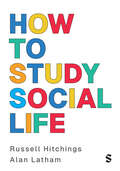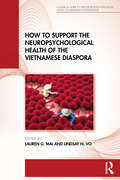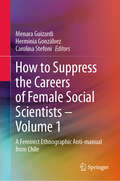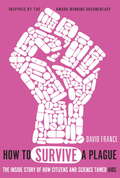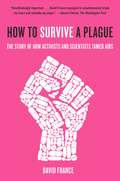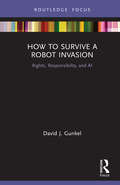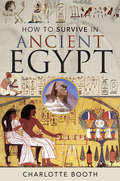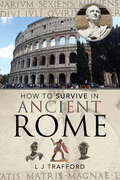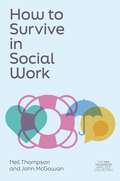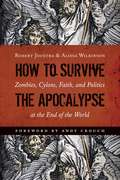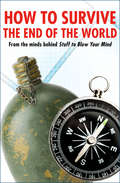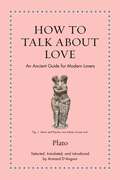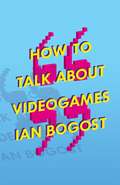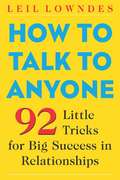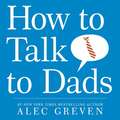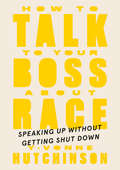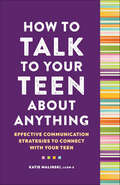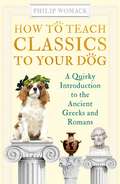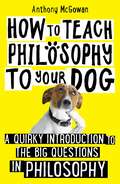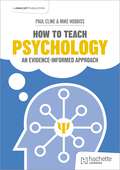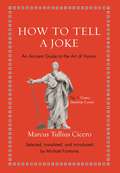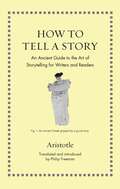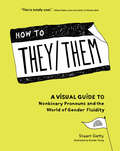- Table View
- List View
How to Study Social Life
by Alan Latham Russell HitchingsDo you want to study what people do, the things they say, or what they think? This book offers a lively and questioning account of the essential elements of social research, from defining your research purpose to producing the right output for your audience. Fostering inquisitiveness and ingenuity and drawing on lots of examples and experiences, it will inspire you to think afresh about the various things you might do as a social researcher. It will also: Reveal the lived realities of research, sharing honest and illuminating stories along the way; Draw on plenty of past exercises with students to consider how different activities work Demystify the process so you can think for yourself about how to do effective projects. Original, engaging and candid, this book will help any undergraduate or postgraduate navigate the dynamic and challenging landscape of social research with confidence and creativity.
How to Study Social Life
by Russell Hitchings Alan LathamDo you want to study what people do, the things they say, or what they think? This book offers a lively and questioning account of the essential elements of social research, from defining your research purpose to producing the right output for your audience. Fostering inquisitiveness and ingenuity and drawing on lots of examples and experiences, it will inspire you to think afresh about the various things you might do as a social researcher. It will also: Reveal the lived realities of research, sharing honest and illuminating stories along the way; Draw on plenty of past exercises with students to consider how different activities work Demystify the process so you can think for yourself about how to do effective projects. Original, engaging and candid, this book will help any undergraduate or postgraduate navigate the dynamic and challenging landscape of social research with confidence and creativity.
How to Support the Neuropsychological Health of the Vietnamese Diaspora (A Clinical Guide to the Neuropsychological Health of Immigrant Populations)
by Lauren G. Mai Lindsay N. VoHow to Support the Neuropsychological Health of the Vietnamese Diaspora is the first book in a new series entitled A Clinical Guide to the Neuropsychological Health of Immigrant Populations, which guides clinicians in the art and science of providing culturally competent services to specific communities. Grounded in evidence-based research and clinical experience, the book offers a better understanding of the unique problems and experiences that the Vietnamese population share, along with examples of how to navigate cultural differences in the assessment and treatment of cognitive impairment.The book reviews the sociocultural and historical factors relevant to those of Vietnamese descent, which help to conceptualize individuals' presentations, common socio-cultural considerations for assessment or treatment, and literature related to working with this population in an international and medical context. It also offers current practice guidelines or approaches to assessment and intervention, along with case studies, a glossary of the necessary cognitive science terms in Vietnamese, and practical resources.It is essential reading for clinicians in the patient care setting, as well as students and researchers in clinical neuropsychology and related fields of psychology, sociology, medicine and forensics.
How to Suppress the Careers of Female Social Scientists – Volume 1: A Feminist Ethnographic Anti-manual from Chile
by Menara Guizardi Herminia Gonzálvez Carolina StefoniThis book is the first of a series of five volumes that analyze and denounce the gender inequalities and violence faced by Latin American female social scientists in academic settings. The five volumes will present and discuss the results of an ethnographic research project conducted in four countries – Argentina, Brazil, Chile, and Mexico – to analyze gender inequalities experienced by Latin American women in five dimensions of academic life: undergraduate education, graduate education, labor insertion, professional performance in stable positions, and gender violence faced at work. This first volume narrates the creation of the research project, from the formulation of its methodological strategy to the application and analysis of its first case study in Chile. It presents the theoretical-methodological perspective adopted in the whole project – a feminist ethnography that draws on the intersubjective role of female experiences to denounce situations of power inequality – and analyses the testimonies of 50 female academics working in 12 universities in nine cities of Chile. The title of the five-volume set, How to Suppress the Careers of Female Social Scientists, pays homage to the seminal work of Joanna Russ about gender inequalities faced by female writers, How to Suppress Women’s Writing, and this first volume is both a "manual" and an "anti-manual". On the one hand, the first two parts of the book serve as a "manual" that situates the Chilean case, clarifies the methodological construction of the research project and discusses the limitations and possibilities of feminist methodologies in the social sciences. On the other hand, the third and fourth parts of the book are ironically presented as an “anti-manual” that explain how the careers of female social scientists are destroyed by intersectional gender-based inequalities and violence, even in social contexts that are open to equity policies.
How to Survive a Plague: The Inside Story of How Citizens and Science Tamed AIDS
by David FranceFrom the creator of the seminal documentary of the same name, an Oscar finalist, the definitive history of the successful battle to halt the AIDS epidemic, and the powerful, heroic stories of the gay activists who refused to die without a fight.Shortly after David France arrived in New York in 1978, the newspaper articles announcing a new cancer specific to gay men seemed more a jab at his new community than a genuine warning. Just three years later, he was reporting on the first signs of what would become an epidemic. Intimately reported, suspenseful, devastating, and finally, inspiring, this is the story of the men and women who watched their friends and lovers fall, ignored by public officials, religious leaders, and the nation at large. Confronted with shame and hatred, they chose to fight, starting protests, rallying a diverse community that had just begun to taste liberation in order to demand their right to live. We witness the founding of ACT UP and TAG (Treatment Action Group), the rise of an underground drug market in opposition to the prohibitively expensive (and sometimes toxic) AZT, and the gradual movement toward a lifesaving medical breakthrough. Throughout, France's unparalleled access to this community immerses us in the lives of extraordinary characters, including the closeted Wall Street trader turned activist; the prominent NIH immunologist with a contentious but enduring relationship with ACT UP; the French high school dropout who finds purpose battling pharmaceutical giants in New York; and the South African physician who helped establish the first officially recognized buyers' club at the height of the epidemic. Expansive yet richly detailed, How to Survive a Plague is an insider's account of a pivotal moment in the history of civil rights.
How to Survive a Plague: The Inside Story of How Citizens and Science Tamed AIDS
by David France<p>The definitive history of the successful battle to halt the AIDS epidemic--from the creator of, and inspired by, the seminal documentary How to Survive a Plague. <p>A riveting, powerful telling of the story of the grassroots movement of activists, many of them in a life-or-death struggle, who seized upon scientific research to help develop the drugs that turned HIV from a mostly fatal infection to a manageable disease. Ignored by public officials, religious leaders, and the nation at large, and confronted with shame and hatred, this small group of men and women chose to fight for their right to live by educating themselves and demanding to become full partners in the race for effective treatments. Around the globe, 16 million people are alive today thanks to their efforts. <p>Not since the publication of Randy Shilts's classic And the Band Played On has a book measured the AIDS plague in such brutally human, intimate, and soaring terms. In dramatic fashion, we witness the founding of ACT UP and TAG (Treatment Action Group), and the rise of an underground drug market in opposition to the prohibitively expensive (and sometimes toxic) AZT. We watch as these activists learn to become their own researchers, lobbyists, drug smugglers, and clinicians, establishing their own newspapers, research journals, and laboratories, and as they go on to force reform in the nation's disease-fighting agencies. <p>With his unparalleled access to this community David France illuminates the lives of extraordinary characters, including the closeted Wall Street trader-turned-activist, the high school dropout who found purpose battling pharmaceutical giants in New York, the South African physician who helped establish the first officially recognized buyers' club at the height of the epidemic, and the public relations executive fighting to save his own life for the sake of his young daughter. <p>Expansive yet richly detailed, this is an insider's account of a pivotal moment in the history of American civil rights. Powerful, heart-wrenching, and finally exhilarating, How to Survive a Plague is destined to become an essential part of the literature of AIDS.</p>
How to Survive a Robot Invasion: Rights, Responsibility, and AI
by David J GunkelIn this short introduction, David J. Gunkel examines the shifting world of artificial intelligence, mapping it onto everyday twenty-first century life and probing the consequences of this ever-growing industry and movement. The book investigates the significance and consequences of the robot invasion in an effort to map the increasingly complicated social terrain of the twenty-first century. Whether we recognize it as such or not, we are in the midst of a robot invasion. What matters most in the face of this machine incursion is not resistance, but how we decide to make sense of and respond to the social opportunities and challenges that autonomous machines make available. How to Survive a Robot Invasion is a fascinating and accessible volume for students and researchers of new media, philosophy of technology, and their many related fields. It aims both to assist readers’ efforts to understand a changing world and to provide readers with the critical insight necessary for grappling with our science fiction-like future.
How to Survive in Ancient Egypt
by Charlotte BoothWhat would it be like if you were transported back to Thebes, 1360 BCE? This time-traveler’s guide is a fascinating way to find out . . . Imagine you were transported back in time to Ancient Egypt and you had to start a new life there. What would you see? How would the people around you think and believe? How would you fit in? Where would you live? What would you eat? Where would you go to have your hair done, or get help if you got ill or were mugged in the street? All these questions, and many more, are answered in this engaging blend of self-help and survival guide that plunges you into this historical environment—and explains the many problems and strange new experiences you would face if you were there.
How to Survive in Ancient Rome
by L J TraffordWhat you’d need to know if you time-traveled to Ancient Rome—from local customs to clothing to religion to housing to food.Imagine you were transported back in time to Ancient Rome and you had to start a new life there. How would you fit in? Where would you live? What would you eat? Where would you go to have your hair done? Who would you go to if you got ill, or if you were mugged in the street? All these questions, and many more, are answered in this new how-to guide for time travelers. This lively and engaging twist on ancient history reveals how to deal with the many problems and new experiences you would face—and thrive in this strange new environment.
How to Survive in Social Work (The Neil Thompson Practice Collection)
by Neil Thompson John McGowanSocial worker. You're a helping hand, a rock in the tempest, a friendly face through the hard times, and a catalyst for change. But what about you? How do you keep going when the pressure just keeps rising?In this no-nonsense handbook, Neil Thompson and John McGowan distil years of social work expertise into key strategies to overcome the challenges that come with the profession. Each chapter is full of clear, practical advice on staying resilient in the face of tough situations, whether they're political, social, or economic. Handy frameworks and expert advice will strengthen your practice and give you a solid structure to build on, helping you fulfil your potential as a social worker and provide better support for your clients. Social work is tough, but with the guidance and support in this book you can learn to tackle the challenges and thrive as a force for change.
How to Survive the Apocalypse: Zombies, Cylons, Faith, and Politics at the End of the World
by Robert Joustra Alissa WilkinsonIncisive insights into contemporary pop culture and its apocalyptic bent. The world is going to hell. So begins this book, pointing to the prevalence of apocalypse — cataclysmic destruction and nightmarish end-of-the-world scenarios — in contemporary entertainment. In How to Survive the Apocalypse Robert Joustra and Alissa Wilkinson examine a number of popular stories — from the Cylons in Battlestar Galactica to the purging of innocence in Game of Thrones to the hordes of zombies in The Walking Dead — and argue that such apocalyptic stories reveal a lot about us here and now, about how we conceive of our life together, including some of our deepest tensions and anxieties. Besides analyzing the dsytopian shift in popular culture, Joustra and Wilkinson also suggest how Christians can live faithfully and with integrity in such a cultural context.
How to Survive the End of the World
by HowstuffworksFrom the creative editorial minds at HowStuffWorks.com comes a volume of entertaining advice to help readers survive the end of the world as we know itIn response to our readers, who are particularly curious about both doomsday scenarios and survivalist techniques, HowStuffWorks.com presents Surviving the End of the World. There are many possible ends in store for our world. Zombie hordes could rise up and eat our brains. A viral pandemic could sweep the globe, decimating the human population but for a hearty, immune few. Or a catastrophic solar superstorm might render all electronics on the planet inert, causing a civilization-ending panic. You won't survive hanging around the dead, the near-dead, or the undead, so in case of Armageddon, head for the hills. Perhaps you're being chased and leave with nothing but a machete and your will to live. Perhaps you actually have time to pack, but you aren't sure what you might need. Once you're in the wilderness, how will you cope? This volume will advise you on such subjects as building shelter in the forest with your bare hands, hunting edible berries in the summer and edible termites year-round, and avoiding the critical stages of dehydration. We even include tips on making moonshine and chocolate, since you'll need something to sweeten the New World Order. If the world as we knew it came to an end, we'd like to think we'd survive. At least, we'd like to think that this book, with its equal parts education and laughter, gives our readers an advantage. Join us for the apocalypse. Let's survive together.
How to Talk about Love: An Ancient Guide for Modern Lovers (Ancient Wisdom for Modern Readers)
by PlatoExplore the nature of love in this charming new translation of selections from Plato&’s great dramatic work, the SymposiumWhat is love? In poetry, songs, fiction, movies, psychology, and philosophy, love has been described, admired, lamented, and dissected in endless ways. Is love based on physical attraction? Does it bring out our better selves? How does it relate to sex? Is love divine? Plato&’s Symposium is one of the oldest, most influential, and most profound explorations of such questions—it is even the source of the idea of &“Platonic love.&” How to Talk about Love introduces and presents the key passages and central ideas of Plato&’s philosophical dialogue in a lively and highly readable new translation, which also features the original Greek on facing pages.The Symposium is set at a fictional drinking party during which prominent Athenians engage in a friendly competition by delivering improvised speeches in praise of Eros, the Greek god of love and sex. The aristocrat Phaedrus, the legal expert Pausanias, the physician Eryximachus, the comic playwright Aristophanes, and the tragic poet Agathon—each by turn celebrates different aspects of love before Socrates proposes not to praise love but to tell the truth about it. In the final speech, the politician and libertine Alcibiades argues that Socrates himself is the epitome of love.Deftly capturing the essence and spirit of Plato&’s masterpiece, How to Talk about Love makes the Symposium more accessible and enjoyable than ever before.
How to Talk about Videogames (Electronic Mediations #47)
by Ian BogostVideogames! Aren&’t they the medium of the twenty-first century? The new cinema? The apotheosis of art and entertainment, the realization of Wagnerian gesamtkunstwerk? The final victory of interaction over passivity? No, probably not. Games are part art and part appliance, part tableau and part toaster. In How to Talk about Videogames, leading critic Ian Bogost explores this paradox more thoroughly than any other author to date.Delving into popular, familiar games like Flappy Bird, Mirror&’s Edge, Mario Kart, Scribblenauts, Ms. Pac-Man, FarmVille, Candy Crush Saga, Bully, Medal of Honor, Madden NFL, and more, Bogost posits that videogames are as much like appliances as they are like art and media. We don&’t watch or read games like we do films and novels and paintings, nor do we perform them like we might dance or play football or Frisbee. Rather, we do something in-between with games. Games are devices we operate, so game critique is both serious cultural currency and self-parody. It is about figuring out what it means that a game works the way it does and then treating the way it works as if it were reasonable, when we know it isn&’t.Noting that the term games criticism once struck him as preposterous, Bogost observes that the idea, taken too seriously, risks balkanizing games writing from the rest of culture, severing it from the &“rivers and fields&” that sustain it. As essential as it is, he calls for its pursuit to unfold in this spirit: &“God save us from a future of games critics, gnawing on scraps like the zombies that fester in our objects of study.&”
How to Talk to Anyone: 92 Little Tricks for Big Success in Relationships
by Leil LowndesA bestselling author and renowned communications consultant offers time-tested hints, tips, and techniques for confidently communicating with others.
How to Talk to Dads
by Alec GrevenNEVER UNDERESTIMATE THE POWER OF THE FATHER! You may think you know all the tricks, but ten-year-old Alec Greven knows that when it comes to dads, you have to be on your toes. Some dads are strict, and some are easygoing, but they all have a good side and a bad side. What you get totally depends on Dad's mood and your attitude. So no matter how old you are or how tight you are with the big guy, trust Alec to help you get down to the bottom of what makes your dad tick. TIPS: There is an 80 percent chance your dad will say yes when your mom says no. Video games calm Dad down and put him in a better mood. If you think Dad is going to let you run wild, you are wrong! ALEC GREVEN is ten years old and is in the fourth grade. He has appeared on The Ellen DeGeneres Show, the Today show, CNN, and Inside Edition. Alec wrote this book when he was nine years old. He is the author of HOW TO TALK TO GIRLS and HOW TO TALK TO MOMS. He lives in Castle Rock, Colorado, with his family.
How to Talk to Your Boss About Race: Speaking Up Without Getting Shut Down
by Y-Vonne HutchinsonAn indispensable practical toolkit for dismantling racism in the workplace without fearReporting and personal testimonials have exposed racism in every institution in this country. But knowing that racism exists isn&’t nearly enough. Social media posts about #BlackLivesMatter are nice, but how do you push leadership towards real anti-racist action?Diversity and inclusion strategist Y-Vonne Hutchinson helps tech giants, political leaders, and Fortune 500 companies speak more productively about racism and bias and turn talk into action. In this clear and accessible guide, Hutchinson equips employees with a framework to think about race at work, prepares them to have frank and effective conversations with more powerful leaders, helps them center marginalized perspectives, and explains how to leverage power dynamics to get results while navigating backlash and gaslighting. How to Talk To Your Boss About Race is a crucial handbook to moving beyond fear to push for change. No matter how much formal power you have, you can create antiracist change at work.
How to Talk to Your Teen About Anything: Effective Communication Strategies to Connect With Your Teen
by Katie MalinskiLearn how to communicate with your teen They want independence but need to know you're there. They need guidance, but they don't want advice. They'll chat with their friends, but not with you. Breaking the wall of silence with your teen can sometimes be difficult, but it's possible to find connection and have really good talks when you know how. This supportive parenting book provides communication tools, advice, and relatable real-life stories that will help you get the conversation started and strengthen your relationship with your teen.What sets How to Talk to Your Teen About Anything apart from other books on parenting teens:Key communication skills—Learn essential communication techniques, including active listening and emotional regulation, and how to deal with communicating in the digital age.Teen parenting 101—Explore what teens want from life and how you can find a balance between discipline, support, and letting go.Recognize your patterns—Understand your patterns, and learn how to set healthy emotional boundaries that will help you prepare for things like sex education (aka "the talk"), and inspire your teen to open up about sensitive topics.Open the lines of communication and bond with them every day using How to Talk to Your Teen About Anything.
How to Teach Classics to Your Dog: A Quirky Introduction to the Ancient Greeks and Romans
by Philip WomackIt should have been a beautiful moment between a man and his dog. Philip Womack made a quip about Cerberus, the three-headed hell-hound, but for Una, the beloved lurcher, it was all Greek. Then she ran off after a squirrel. And Womack was left to wonder what else she didn&’t know about the great civilisations of the past. The Greeks and the Romans laid the foundations of so much of what we read, listen to and watch today, from the baked pies of Game of Thrones to the Lotus-eaters of Love Island. In this unique introduction, Womack leads Una and us on a fleet-footed odyssey through the classical world. You&’ll learn to tell your Odysseus from your Oedipus, your Polyxena from your Polydorus…but the story of the hunting dogs that tore their own master apart may be best left for another day.
How to Teach Philosophy to Your Dog: A Quirky Introduction to the Big Questions in Philosophy
by Anthony McGowanMonty was just like any other dog. A scruffy and irascible Maltese terrier, he enjoyed barking at pugs and sniffing at trees. But after yet another dramatic confrontation with the local Rottweiler, Anthony McGowan realises it&’s high time he and Monty had a chat about what makes him a good or a bad dog. And they don&’t stop at ethics. Taking his cue from Monty&’s canine antics, McGowan leads us on an enlightening jaunt through the world of philosophy. Will Kant convince Monty to stop stealing cheesecake? How long will they put up with Socrates poking holes in every argument? Do they have free will to pursue answers to these questions? Join the dutiful duo as they set out to uncover who – if anyone – has the right end of the ethical stick and can tell us how best to live one&’s life. But there is also a shadow over their conversations. Monty is not well… And so towards the end the biggest questions raise their heads: is there a God? Does life have a meaning? By the time of their last walk together, Monty – and the reader – will find that they have not just solved a few philosophical puzzles, but absorbed much of the history of Western philosophy.
How to Teach Psychology: An evidence-informed approach
by Paul Cline Mike HobbissPsychology as a subject is more popular in secondary schools than ever before, but achieving deep insights into, and appreciation of, the complexity of human behaviour is a challenge that requires expert guidance and teaching. In addition to teaching the often demanding subject content on their specifications, Psychology teachers must also be experts in inculcating mathematical skills and written communication. All this in students who often start without any prior experience of the subject. This poses serious challenges for teachers' subject knowledge, pedagogy and planning. And yet, until now, little has been written about how to teach Psychology effectively. This book aims to help anyone facing that challenge. Drawing on a wealth of psychological and pedagogical insights, coupled with years of teaching experience, Paul Cline and Mike Hobbiss provide practical advice and concrete suggestions to support Psychology teachers at all levels. From curriculum choices to the minutiae of in-class decisions, from developing as an individual teacher to leading a Psychology department, this book provides the complete, evidence-informed guide to teaching Psychology.
How to Teach Psychology: An evidence-informed approach
by Paul Cline Mike HobbissPsychology as a subject is more popular in secondary schools than ever before, but achieving deep insights into, and appreciation of, the complexity of human behaviour is a challenge that requires expert guidance and teaching. In addition to teaching the often demanding subject content on their specifications, Psychology teachers must also be experts in inculcating mathematical skills and written communication. All this in students who often start without any prior experience of the subject. This poses serious challenges for teachers' subject knowledge, pedagogy and planning. And yet, until now, little has been written about how to teach Psychology effectively. This book aims to help anyone facing that challenge. Drawing on a wealth of psychological and pedagogical insights, coupled with years of teaching experience, Paul Cline and Mike Hobbiss provide practical advice and concrete suggestions to support Psychology teachers at all levels. From curriculum choices to the minutiae of in-class decisions, from developing as an individual teacher to leading a Psychology department, this book provides the complete, evidence-informed guide to teaching Psychology.
How to Tell a Joke: An Ancient Guide to the Art of Humor (Ancient Wisdom for Modern Readers)
by Marcus Tullius CiceroTimeless advice about how to use humor to win over any audienceCan jokes win a hostile room, a hopeless argument, or even an election? You bet they can, according to Cicero, and he knew what he was talking about. One of Rome’s greatest politicians, speakers, and lawyers, Cicero was also reputedly one of antiquity’s funniest people. After he was elected commander-in-chief and head of state, his enemies even started calling him “the stand-up Consul.” How to Tell a Joke provides a lively new translation of Cicero’s essential writing on humor alongside that of the later Roman orator and educator Quintilian. The result is a timeless practical guide to how a well-timed joke can win over any audience.As powerful as jokes can be, they are also hugely risky. The line between a witty joke and an offensive one isn’t always clear. Cross it and you’ll look like a clown, or worse. Here, Cicero and Quintilian explore every aspect of telling jokes—while avoiding costly mistakes. Presenting the sections on humor in Cicero’s On the Ideal Orator and Quintilian’s The Education of the Orator, complete with an enlightening introduction and the original Latin on facing pages, How to Tell a Joke examines the risks and rewards of humor and analyzes basic types that readers can use to write their own jokes.Filled with insight, wit, and examples, including more than a few lawyer jokes, How to Tell a Joke will appeal to anyone interested in humor or the art of public speaking.
How to Tell a Story: An Ancient Guide to the Art of Storytelling for Writers and Readers (Ancient Wisdom for Modern Readers)
by AristotleAn inviting and highly readable new translation of Aristotle’s complete Poetics—the first and best introduction to the art of writing and understanding storiesAristotle’s Poetics is the most important book ever written for writers and readers of stories—whether novels, short fiction, plays, screenplays, or nonfiction. Aristotle was the first to identify the keys to plot, character, audience perception, tragic pleasure, and dozens of other critical points of good storytelling. Despite being written more than 2,000 years ago, the Poetics remains essential reading for anyone who wants to learn how to write a captivating story—or understand how such stories work and achieve their psychological effects. Yet for all its influence, the Poetics is too little read because it comes down to us in a form that is often difficult to follow, and even the best translations are geared more to specialists than to general readers who simply want to grasp Aristotle’s profound and practical insights. In How to Tell a Story, Philip Freeman presents the most readable translation of the Poetics yet produced, making this indispensable handbook more accessible, engaging, and useful than ever before.In addition to its inviting and reliable translation, a commentary on each section, and the original Greek on facing pages, this edition of the Poetics features unique bullet points, chapter headings, and section numbers to help guide readers through Aristotle’s unmatched introduction to the art of writing and reading stories.
How to They/Them: A Visual Guide to Nonbinary Pronouns and the World of Gender Fluidity
by Stuart Getty&“This tender, smart, personal book is a gift. Stuart Getty generously shows us, with witty illustrations and kind humor, the hows and whys of they/them pronouns. A wonderful and necessary resource that is a delight to read.&”—Michelle Tea, author of Modern Tarot and ValenciaWhat does nonbinary really mean? What is gender nonconforming? And isn't they a plural pronoun? In this charming and disarming guide, a real-life they-using genderqueer writer unpacks all your burning questions in a fun, visual way. No soapboxes or divisive comment-section wars here!Sometimes funny, sometimes serious, always human, this gender-friendly primer will get you up to speed. It's about more than just bathrooms and pronouns--this is about gender expression and the freedom to choose how to identify. While they might only be for some, that freedom is for everyone!&“[A] clear, kind guide to gender nonconformity. Getty's cheeky tone and the punchy black-and-white illustrations by Brooke Thyng make this book a useful reference for anyone with questions about gender, whether their own or those they witness in the larger world.&”—Booklist&“Straightforward, practical, relevant navigation through the radiant world of gender fluidity.&”—Kirkus Reviews
